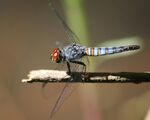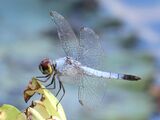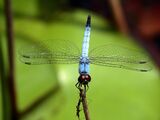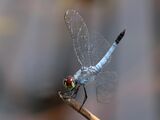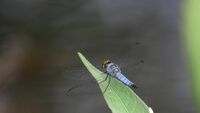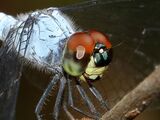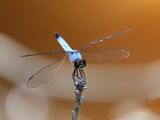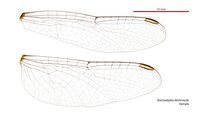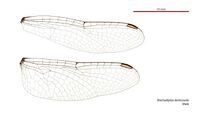Biology:Brachydiplax denticauda
| Palemouth | |
|---|---|
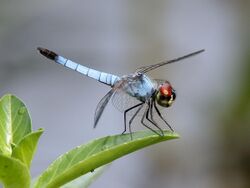
| |
| Male Brachydiplax denticauda | |
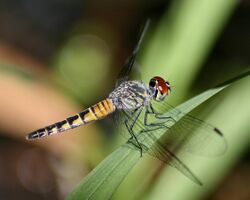
| |
| Female Brachydiplax denticauda | |
| Scientific classification | |
| Domain: | Eukaryota |
| Kingdom: | Animalia |
| Phylum: | Arthropoda |
| Class: | Insecta |
| Order: | Odonata |
| Infraorder: | Anisoptera |
| Family: | Libellulidae |
| Genus: | Brachydiplax |
| Species: | B. denticauda
|
| Binomial name | |
| Brachydiplax denticauda (Brauer, 1867)[2]
| |
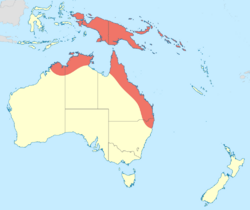
| |
Brachydiplax denticauda is a species of dragonfly in the family Libellulidae[3] known commonly as the palemouth.[4] It is native to Australia , Indonesia, Papua New Guinea, and the Solomon Islands.[5] It lives in habitat with still and slow-moving waters.[1]
Males of this species are typical in colour for the genus,[1] being bright powder blue on both the thorax and abdomen. The labrum is pale cream, thus giving the species its common name of palemouth. In northern Australia , it is found coastal and adjacent inland in an arc from the southern Queensland border to Broome, Western Australia.[6]
Brief Description
This species is small in size with a wingspan of 40 to 60 millimeters. Brachydiplax denticauda usually has six antenodal crossveins in the fore-wing and five in the hind-wing whereas the very similar Brachydiplax duivenbodei has seven antenodal crossveins in the fore-wing and six in the hind-wing.[7] Though brightly coloured, the males often go unnoticed by an observer once they land on a lily pad or similar place.[7]
Gallery
References
- ↑ 1.0 1.1 1.2 Kalkman, V.J. (2020). "Brachydiplax denticauda". IUCN Red List of Threatened Species 2020: e.T163899A83378624. doi:10.2305/IUCN.UK.2020-1.RLTS.T163899A83378624.en. https://www.iucnredlist.org/species/163899/83378624. Retrieved 19 November 2021.
- ↑ Brauer, F. (1867). "Bericht über die von Hrn. Dir. Kaup eingesendeten Odonaten. (Schluss.)". Verhandlungen der Zoologisch-Botanischen Gesellschaft in Wien 17: 287–302 [301]. https://www.biodiversitylibrary.org/page/26724784.
- ↑ "Species Brachydiplax denticauda (Brauer, 1867)". Australian Biological Resources Study. 2012. https://biodiversity.org.au/afd/taxa/Brachydiplax_denticauda.
- ↑ Brachydiplax denticauda. Atlas of Living Australia.
- ↑ Watson, J.A.L.; Theischinger, G.; Abbey, H.M. (1991). The Australian Dragonflies: A Guide to the Identification, Distributions and Habitats of Australian Odonata. Melbourne: CSIRO. pp. 278. ISBN 0643051368.
- ↑ Theischinger, Gunther; Endersby, Ian (2009). Identification Guide to the Australian Odonata. Department of Environment, Climate Change and Water NSW. pp. 207. ISBN 978 1 74232 475 3. http://www.environment.nsw.gov.au/resources/publications/09730AustOdonata.pdf.
- ↑ 7.0 7.1 Theischinger, Gunther; Hawking, John (2006). The Complete Field Guide to Dragonflies of Australia. Collingwood Vic.: CSIRO. p. 270. ISBN 0643090738.
Wikidata ☰ Q1313766 entry
 |

